Bolivian President Evo Morales once again used the opportunity of May 1, the international workers’ day, to announce his left-wing government's latest nationalisation. This time, it was the turn of Transportadora de Electridad (TDE), a subsidiary of the Spanish-owned Red Electrica de Espana (REE), which controlled Bolivia’s national electricity transmission grid.
The nationalisation was another step towards meeting the long-standing demand of the Bolivian people to return privatised companies to state hands.
-
-
As Rocky Mountaineer’s lockout of award-winning on-board staff enters its 10th month, ads are once again being placed to hire more scab workers. Rocky Mountaineer is Canada’s luxury tourist train that takes tourists throughout the summer months from Vancouver to the scenic Rocky Mountains. Nearly 40% of these visitors to Canada come from Australia. On June 22 last year, as the Rocky Mountaineer pulled into Kamloops for its overnight stop, regular staff were ordered off the train and sent back to their homes in Vancouver. One hundred and eight staff were locked out.
-
 Much of the world’s population continues to pay for the global financial crisis with their jobs, homes, education and health. Bankers continue to award themselves millions of dollars in bonuses, such as the British bank Barclay’s chief executive, who last year earned US$26.9 million. The Venezuelan government, however, has raised the percentage of net profits banks must grant in credit to national social programs. In doing so, it is demonstrating to the rest of the world what a regulated and socially oriented banking system could look like.
Much of the world’s population continues to pay for the global financial crisis with their jobs, homes, education and health. Bankers continue to award themselves millions of dollars in bonuses, such as the British bank Barclay’s chief executive, who last year earned US$26.9 million. The Venezuelan government, however, has raised the percentage of net profits banks must grant in credit to national social programs. In doing so, it is demonstrating to the rest of the world what a regulated and socially oriented banking system could look like. -
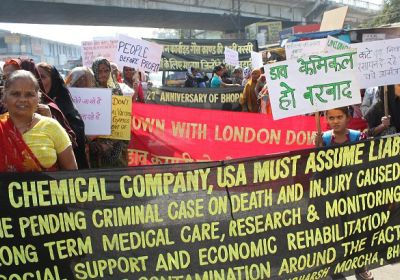 The 30th Olympic games will begin in July in London as Britain's Conservative-Liberal Democratic government imposes savage austerity measures on the public. The excitement of watching the world's sporting best compete is mixed with fears of social and economic upheaval. The British government is projected to spend US$14.5 billion on the games, $9.6 billion over budget. Prime Minister David Cameron announced last November that the budget for the opening and closing ceremonies would be doubled to $125 million.
The 30th Olympic games will begin in July in London as Britain's Conservative-Liberal Democratic government imposes savage austerity measures on the public. The excitement of watching the world's sporting best compete is mixed with fears of social and economic upheaval. The British government is projected to spend US$14.5 billion on the games, $9.6 billion over budget. Prime Minister David Cameron announced last November that the budget for the opening and closing ceremonies would be doubled to $125 million. -
 With the Spanish economy sinking and 12 countries in Europe mired in recession, politicians and bankers are once again worried about a financial meltdown on the continent as the result of the crisis in the eurozone. Adding to the concerns among politicians and financial policymakers is the prospect that elections in France and Greece on May 6 could upend the austerity packages agreed to by European leaders in December.
With the Spanish economy sinking and 12 countries in Europe mired in recession, politicians and bankers are once again worried about a financial meltdown on the continent as the result of the crisis in the eurozone. Adding to the concerns among politicians and financial policymakers is the prospect that elections in France and Greece on May 6 could upend the austerity packages agreed to by European leaders in December. -
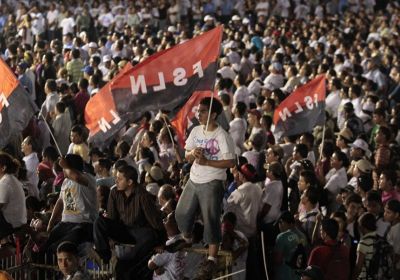 Nicaragua's President Daniel Ortega and a crowd of more than 100,000 people gathered on the night of May 2 in Managua's Plaza de la Fe to pay tribute to Tomas Borge. Borge, who died on April 30 aged 81, was the last surviving member of the group that founded the Sandinista National Liberation Front (FSLN) more than 50 years ago. Borge has always been and remains a symbol of the Nicaraguan Revolution in Latin America and beyond.
Nicaragua's President Daniel Ortega and a crowd of more than 100,000 people gathered on the night of May 2 in Managua's Plaza de la Fe to pay tribute to Tomas Borge. Borge, who died on April 30 aged 81, was the last surviving member of the group that founded the Sandinista National Liberation Front (FSLN) more than 50 years ago. Borge has always been and remains a symbol of the Nicaraguan Revolution in Latin America and beyond. -
 You are all potential terrorists. It matters not that you live in Britain, the United States, Australia or the Middle East. Citizenship is effectively abolished. Turn on your computer and the US Department of Homeland Security's National Operations Centre may monitor whether you are typing not merely "al-Qaeda", but "exercise", "drill", "wave", "initiative" and "organisation": all proscribed words. The British government's announcement that it intends to spy on every email and phone call is old hat. The satellite vacuum cleaner known as Echelon has been doing this for years.
You are all potential terrorists. It matters not that you live in Britain, the United States, Australia or the Middle East. Citizenship is effectively abolished. Turn on your computer and the US Department of Homeland Security's National Operations Centre may monitor whether you are typing not merely "al-Qaeda", but "exercise", "drill", "wave", "initiative" and "organisation": all proscribed words. The British government's announcement that it intends to spy on every email and phone call is old hat. The satellite vacuum cleaner known as Echelon has been doing this for years. -
“Two years of brutal Con-Dem cuts and failings have left the nation seeing red as Labour gained hundreds of seats across local councils today,” Britain's Morning Star reported on May 4. The article said the council elections took place against a “backdrop of a double-dip recession, despite massive cuts to jobs and services”. The Conservative Party lost 11 councils to Labour and the Conservatives' coalition partner in government, the Liberal Democrats, lost one.
-
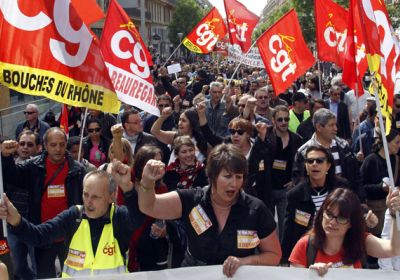 People from all sides of politics came out on the streets of Paris in great numbers on May 1. Ahead of the second round of the French presidential poll on May 6, it was a highly politicised May Day. In the first round on April 22, the Socialist Party's Francois Hollande beat the right-wing incumbent Nicolas Sarkozy. The far right National Front's candidate Marine Le Pen scored a record vote of about 18%. The Left Front's Jean-Luc Melenchon took about 11% of the vote.
People from all sides of politics came out on the streets of Paris in great numbers on May 1. Ahead of the second round of the French presidential poll on May 6, it was a highly politicised May Day. In the first round on April 22, the Socialist Party's Francois Hollande beat the right-wing incumbent Nicolas Sarkozy. The far right National Front's candidate Marine Le Pen scored a record vote of about 18%. The Left Front's Jean-Luc Melenchon took about 11% of the vote. -
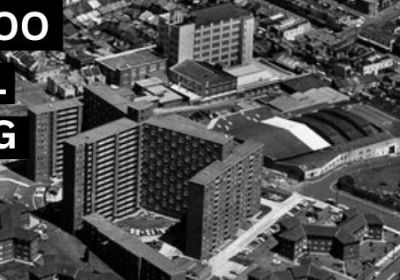
More than 8000 people demonstrated in Auckland on April 28 against the privatisation and give away of public assets in Aotearoa (New Zealand). A few days earlier, a Hikoi (walk) began from Cape Reinga in the far north of New Zealand's north island, headed for the capital, Wellington.
-
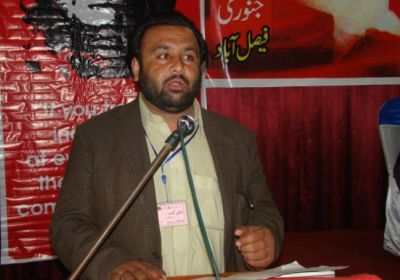 The Labour Party of Pakistan has reported that LPP member Baba Jan and other activists in Gilgit district jail were severely beaten and tortured by dozens of Rangers, Police and Frontier Constabulary in the early morning of April 28. In response, an international campaign is being organised for the release of Baba Jan and other activists jailed last year for campaigning for compensation for flood victims. After devastating floods swept the Atta Abad Lakes region of Pakistan last year, police opened fire on a demonstration of people demanding compensation. Two people were killed.
The Labour Party of Pakistan has reported that LPP member Baba Jan and other activists in Gilgit district jail were severely beaten and tortured by dozens of Rangers, Police and Frontier Constabulary in the early morning of April 28. In response, an international campaign is being organised for the release of Baba Jan and other activists jailed last year for campaigning for compensation for flood victims. After devastating floods swept the Atta Abad Lakes region of Pakistan last year, police opened fire on a demonstration of people demanding compensation. Two people were killed. -
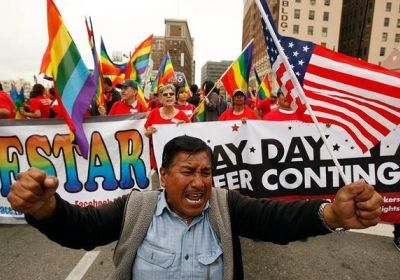
The Occupy movement in the United States relaunched itself on May 1 when thousands of people rallied in more than 130 cities across the country to mark May Day — the international day to mark working people's struggles.